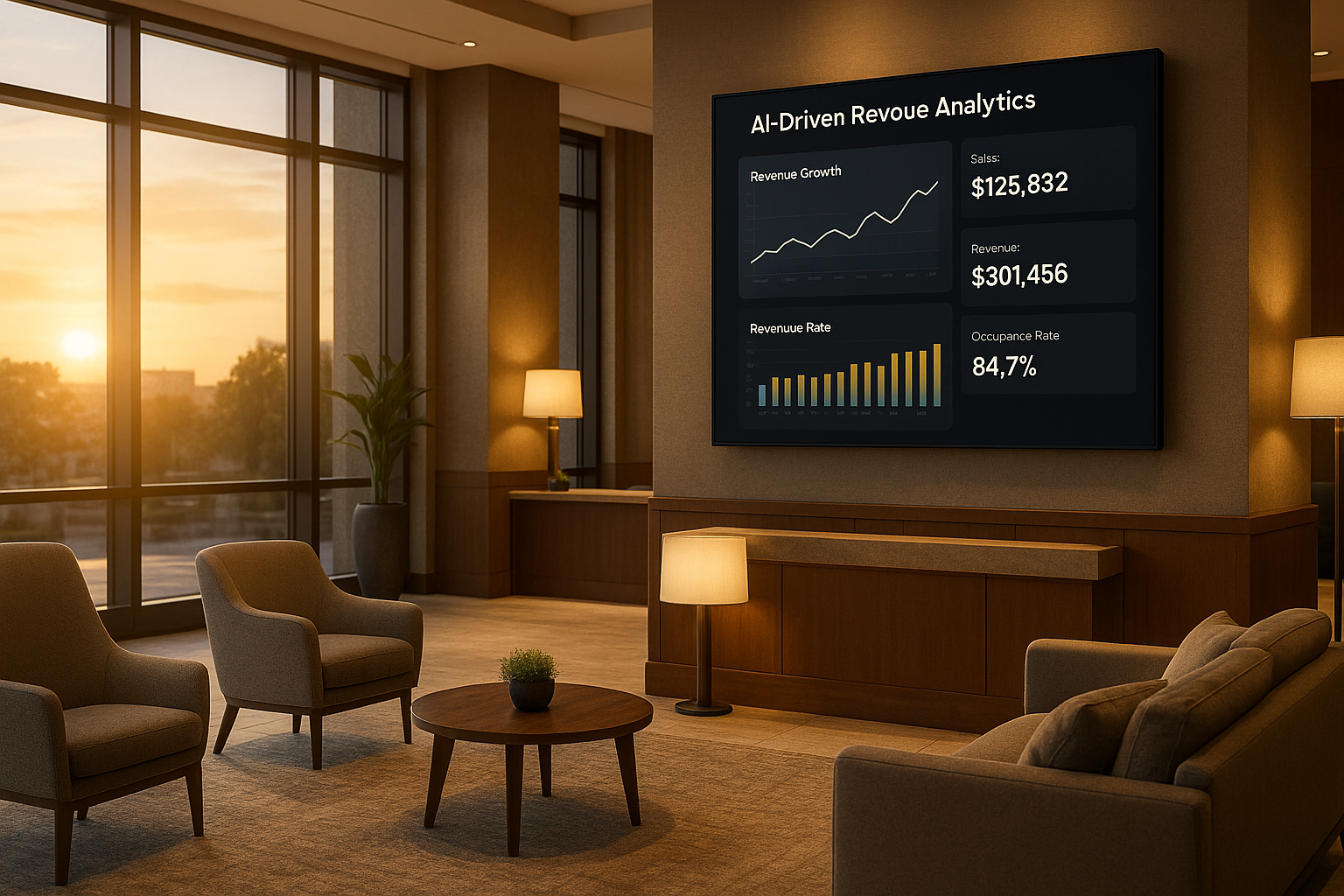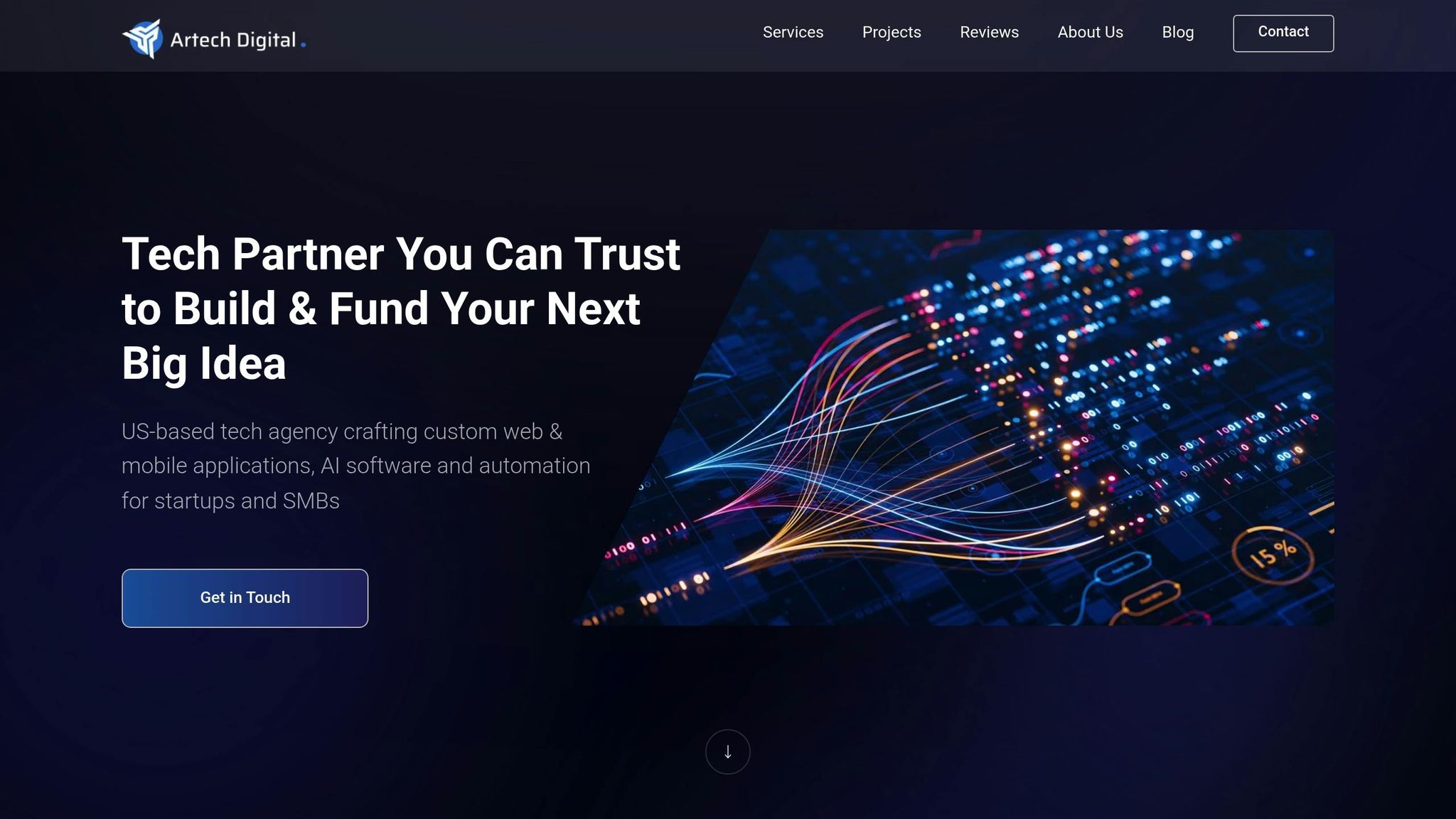
AI is reshaping the hospitality industry, driving revenue growth and improving guest experiences. Hotels, restaurants, and travel companies are leveraging AI tools to improve pricing, personalize services, and reduce costs.
AI is transforming hospitality by optimizing pricing, automating tasks, and creating tailored guest experiences. Hotels that adopt AI now stand to gain a competitive edge.
AI-powered systems have transformed how hotels approach pricing by analyzing real-time market conditions, competitor rates, local events, weather forecasts, and booking patterns. These systems dynamically adjust prices, taking the guesswork out of rate-setting and helping businesses avoid costly miscalculations. The result? Smarter pricing strategies that drive better financial results, streamline operations, and create more personalized guest experiences.
"When a reservation comes in at a rate I never would have dared to set myself, I just smile. The system knows better than I do." - Sydney Rubin, Owner/Operator of Maitland Manor
The numbers don’t lie. According to a study by the Cornell University School of Hotel Administration, hotels using AI-powered revenue management systems see an average revenue increase of 7.2% compared to traditional methods. Properties that fully integrate AI into their operations report even bigger gains, with revenue jumping by 17% and occupancy rates improving by 10%.
One major American hospitality company plans to allocate $1 billion to $1.2 billion in 2024 for technology investments, with a strong focus on AI-driven demand forecasting. These systems analyze massive amounts of historical booking data alongside real-time market trends, enabling them to predict demand shifts with precision.
Hotels are increasingly adopting the airline industry's dynamic pricing model, adjusting room rates in real time to reflect market conditions and maximize revenue opportunities.
"Airlines have long been pioneers in dynamic pricing, adjusting fares based on demand, booking patterns, and other factors. Hotels and other travel companies can adopt similar strategies to adjust room rates and package prices in real time, allowing them to better match market conditions and optimize revenue." - Lee Taylor, head of hospitality sales at Capgemini
AI systems are also a game-changer for operational efficiency. Studies show that revenue managers currently spend 51% of their time on tasks that don’t directly contribute to revenue generation. By automating repetitive tasks like data analysis, competitor monitoring, and pricing adjustments, AI frees up managers to focus on strategic initiatives.
Another significant advantage is the elimination of human bias in pricing decisions. Traditional methods often rely on intuition or past experiences, which can lead to inaccurate pricing. AI systems, on the other hand, make objective decisions based solely on current market data.
Integration is key to maximizing these benefits. AI-powered revenue management systems work seamlessly with tools like property management systems (PMS), customer relationship management (CRM) platforms, and enterprise resource planning (ERP) systems. This interconnected approach ensures smooth data flow and removes inefficiencies caused by siloed systems.
"A unified system architecture allows seamless integration of revenue management systems (RMS) with other critical business tools such as enterprise resource planning (ERP) and customer relationship management (CRM) platforms, ensuring accurate, real-time data flow. This eliminates data silos and reduces manual interventions, improving decision-making and operational efficiency." - Lee Taylor, head of hospitality sales at Capgemini
AI isn’t just about improving backend operations - it’s also revolutionizing how hotels engage with guests. By analyzing customer behavior and spending patterns across various touchpoints, AI systems deliver personalized offers and predict guest needs. This approach not only boosts conversion rates but also builds stronger customer loyalty.
"AI uses historical data and machine learning models to forecast future demand. This ability to anticipate booking trends helps revenue managers optimize inventory and pricing strategies, ensuring they can adjust to market changes quickly. By accurately forecasting demand, businesses can ensure that they have the right inventory available at the right time. This reduces the chances of overbooking or underbooking, leading to a smoother and more reliable booking experience for customers." - Ryan Mummert, senior principal, insights and data portfolio leader at Capgemini
With AI taking over routine tasks, revenue managers are stepping into more strategic roles. Instead of spending their time on manual data crunching, they now focus on high-level decisions that enhance market positioning and elevate the guest experience. This shift is redefining the role of revenue managers in the hospitality industry.
AI isn't just changing how hotels price their rooms - it’s transforming how they interact with guests. By using AI-driven tools, hotels can deliver highly personalized and efficient services, anticipating what guests need and offering instant support in ways that traditional methods simply can't match.
The financial upside of these tools is hard to ignore. AI-powered guest experience solutions allow hotels to charge premium rates by offering tailored services. In fact, 61% of hotel guests say they’re willing to pay extra for personalized experiences, but only 23% feel they’ve received that level of customization during recent stays. This gap presents a huge opportunity for hotels to increase revenue. By adopting AI-driven personalization, hotels can improve both their average daily rates and the lifetime value of their guests.
The demand for AI-enhanced services is also growing. About 30% of travelers say they’re likely to use AI tools to plan their trips. Beyond boosting revenue, these technologies make operations smoother, benefiting both guests and staff.
AI doesn’t just enhance the guest experience - it also makes hotel operations more efficient. Automating routine tasks and better allocating resources are top priorities for 70% of hotel leaders, according to PwC research. AI-powered systems can handle guest inquiries instantly, and 70% of travelers report finding automated assistance helpful for service requests.
Hotels like Hilton are already reaping the benefits. Hilton’s AI chatbots assist guests throughout their stay, from check-in to personalized recommendations. Similarly, Radisson Hotel Group has introduced AI-driven self-service kiosks that speed up check-ins and check-outs, cutting down wait times and improving convenience.
AI also optimizes housekeeping schedules using real-time data, ensuring rooms are ready when guests need them. And with predictive maintenance, hotels can fix potential issues before they disrupt a guest’s stay. These operational improvements pave the way for more proactive and engaging guest interactions.
AI takes guest engagement to the next level by turning data into meaningful, personalized experiences. Instead of reacting to guest requests, hotels can use AI to anticipate needs and deliver proactive hospitality. For example, smart room technology is making waves - Wynn Las Vegas has equipped rooms with Amazon Echo devices integrated with Alexa, allowing guests to control their room settings with simple voice commands. This kind of customization aligns with the expectations of 65% of travelers who want hotel technology to surpass what they have at home.
AI also enhances the guest experience by offering tailored recommendations. It can suggest dining options based on dietary preferences, recommend local attractions that match guest interests, and even adjust room settings based on previous stays. Otonomus Hotel has gone a step further, letting guests personalize everything from room settings to amenities, with plans to introduce digital twin avatars and gamified onboarding experiences.
The shift toward hyper-personalization is happening fast. A Deloitte survey found that 52% of respondents believe generative AI will soon handle customer interactions, while 44% expect it to play a key role in guest engagement. However, as hotels embrace these tools, they must strike a balance - using AI to handle routine tasks while ensuring staff are available to create meaningful connections and address more complex guest needs. This combination of technology and human hospitality is the key to staying ahead in the industry.

Artech Digital specializes in creating tailored AI solutions designed to boost revenue and simplify hotel operations. With over a decade of experience and more than 50 successful projects, the company has built a reputation for delivering AI tools that drive real-world business outcomes.
Artech Digital’s AI tools directly contribute to revenue growth by automating tasks and improving guest services. By automating routine inquiries, their systems can save businesses over 5,500 hours annually, translating into significant cost savings and better operational margins. A great example is Hawaiian Beach Rentals, which adopted Artech Digital’s custom AI chatbot in July 2025. This chatbot handles guest interactions, answers frequently asked questions, and organizes booking details. The result? Savings of around $4,000–$5,000 monthly and a reduction of 1,200 hours of support work per month - hours that were redirected to higher-value guest services. These savings highlight the potential for even greater efficiencies, as explored further below.
"Just an expert-built AI solution that ships fast and pays for itself." - Artech Digital
Artech Digital’s AI & Data Systems go beyond revenue gains by optimizing hotel operations in ways traditional software simply can’t. Their services include AI agents, Retrieval-Augmented Generation (RAG), fine-tuning, and private large language models, all designed to streamline processes and enhance functionality. These AI agents can juggle multiple tasks at once, such as managing booking inquiries and integrating seamlessly with internal systems to ensure smooth guest experiences.
One standout example is their AI-powered FAQ system for restaurant chains, built using advanced GPT-4 technology. This system automates customer inquiries, dramatically reduces response times, and integrates with CRM and POS systems to ensure accurate, consistent answers 24/7. Hawaiian Beach Rentals has demonstrated how these tools can enhance operations without requiring a full system overhaul, showing that AI can work alongside existing infrastructure to deliver real benefits.
Artech Digital’s AI solutions redefine guest interactions by providing personalized, immediate assistance. Their advanced chatbots and AI agents analyze data like guest preferences, booking history, and behavior to offer tailored recommendations and services. This level of personalization aligns with the hospitality industry’s growing focus on data-driven guest experiences.
Additionally, Artech Digital employs computer vision and custom machine learning models to elevate guest engagement. These tools can recognize returning guests, anticipate their needs based on past visits, and proactively suggest relevant services or amenities. With 78% of travelers preferring accommodations that offer personalized options and 60% of leisure travelers under 45 in North America using AI for travel planning, these solutions position hotels to meet and exceed modern guest expectations.
"AI-driven data utilization has greatly enhanced personalization in hospitality by analyzing guest preferences, booking history, and behavior patterns." - Kim Wilson, Principal and Client Partner at Capgemini
Understanding the strengths and challenges of various AI solutions is crucial for making smart investment choices. Below, we break down the key benefits and limitations of different AI systems, followed by a summary of their overall performance.
AI-Powered Revenue Management Systems are excellent at driving revenue growth using advanced pricing algorithms and demand forecasting. For instance, PriceLabs' Hyper Local Pulse dynamic pricing algorithm has been shown to increase RevPar by an average of 26% for new users. However, these systems often require a large initial investment and don't directly improve guest interaction.
AI-Driven Guest Experience Tools excel at delivering personalized interactions, which can boost customer satisfaction. While these tools indirectly contribute to revenue growth, they can be challenging to integrate with existing systems, making it harder to measure short-term ROI.
Artech Digital's AI Solutions offer a well-rounded approach, impacting revenue, operational efficiency, and guest engagement. With a proven track record of generating over $24 million in AI-driven value for businesses, their solutions stand out. For example, a case study with Hawaiian Beach Rentals shows how a custom AI chatbot cut operational costs by $4,000–$5,000 per month while improving guest engagement through 24/7 availability and personalized service.
Here’s a quick comparison of the three solutions:
| Solution | Revenue Impact | Operational Efficiency | Guest Engagement |
|---|---|---|---|
| AI-Powered Revenue Management Systems | High | Moderate | Low |
| AI-Driven Guest Experience Tools | Moderate | Low | High |
| Artech Digital's AI Solutions | High | High | High |
Artech Digital's custom approach sets it apart by addressing all three key areas - revenue, efficiency, and engagement - without forcing businesses to compromise. Their impressive 96%+ Job Success Score and placement in the top 1% of Upwork's Expert-Vetted talent pool demonstrate their ability to design solutions tailored to individual needs. This focus on customization helps avoid the typical trade-offs seen with more generic AI tools.
To ensure smooth integration, a strong data infrastructure and proper workforce training are essential. Artech Digital addresses these challenges with rapid prototyping and iterative development, which not only simplify integration but also help businesses achieve ongoing ROI growth.
AI adoption is rapidly becoming a cornerstone for revenue growth in the hospitality industry. Analysts predict that the market for AI technology in this sector will skyrocket from $90 million in 2023 to a staggering $8 billion by 2033. That’s an annual growth rate of 60%. Hotels that embrace this shift stand to gain a strong edge over competitors.
The financial advantages of AI are already evident. The industry’s evolution from mobile-first to AI-first strategies is fundamentally altering how hotels manage operations, price their services, and connect with guests.
"AI is not just a technological shift - it is a business game-changer for hospitality." – Binu Mathews, DIRECTOR & CEO at IDS Next
Integrated AI solutions that enhance pricing models, improve operational efficiency, and elevate guest experiences are proving to deliver the best results. Effective data management and smooth system integration are key to success. Approximately 80% of hotels are either currently using or planning to adopt AI and data analytics to create personalized guest experiences.
The future of hospitality will belong to those who strike the right balance between AI-driven efficiency and the human touch that guests still value. According to Gartner, blending human expertise with AI could lead to a 25% boost in both operational efficiency and customer satisfaction by 2025. The best-performing hotels will leverage AI to free up staff for meaningful, high-value guest interactions.
To make this vision a reality, hotels need a strategic approach to AI implementation. Partnering with experienced providers like Artech Digital (https://artech-digital.com) ensures that AI initiatives are not just ambitious ideas but practical solutions that drive measurable revenue growth and operational improvements. With competition intensifying, the time to act is now.
AI-powered revenue management tools help hotels boost revenue and improve occupancy rates by using real-time data analysis, dynamic pricing, and precise demand forecasting. These systems dig into market trends, competitor pricing, and customer behavior to suggest the best pricing strategies, keeping hotels competitive and profitable.
By automating intricate tasks, these tools allow hotels to roll out targeted promotions, adjust rates based on shifting demand, and uncover new revenue opportunities. The result? Greater efficiency, increased profits, and happier guests - all while lightening the workload for hotel staff.
AI is transforming how hotels manage costs and streamline operations. By automating repetitive tasks, optimizing resource allocation, and improving energy usage, hotels can achieve impressive savings and boost efficiency. For example, AI-driven systems can slash operational expenses by as much as 30% to 40% through smarter task distribution and automation.
Energy management is another area where AI shines. Some hotels have reported saving millions of dollars annually on utility bills by adopting AI-powered solutions. Beyond energy savings, AI simplifies processes like billing and checkouts, reducing administrative costs while making the experience smoother for guests. These advancements allow hotels to run more efficiently and provide a higher level of service at the same time.
AI is transforming the hospitality industry by making guest experiences more tailored and enjoyable. Picture this: a hotel room that remembers your favorite lighting and temperature settings or dining suggestions that align perfectly with your dietary preferences. These personalized touches make a stay feel less like a transaction and more like a thoughtful experience.
Then there’s the convenience of AI-powered virtual assistants and chatbots. They handle service requests almost instantly, cutting down wait times and ensuring quick responses. This kind of efficiency not only keeps guests happy but also encourages them to return. By anticipating what guests might need and delivering seamless service, AI doesn’t just enhance the experience - it plays a key role in building loyalty and boosting business revenue.
.png)

.png)